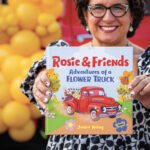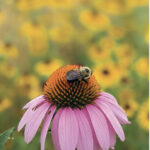
When the first candle burns on the Pennsylvania menorah outside the Capitol this year, a new, virtual audience will join those attending a commemoration normally held indoors.
“The message from the Capitol that goes out to the state is that we have to illuminate and make the world brighter, kinder, gentler,” said Rabbi Shmuel Pewzner, originator of the annual Hanukkah celebration. “That’s what Hanukkah is all about.”
This year, Harrisburg’s faith institutions are preparing for holidays like no other. They have learned from eight months of lockdown how to assure full inclusion of all who want to worship and celebrate. For the holidays, they will be sharing messages of overcoming a grim year through perseverance and hope.
Wide Net
Earlier this year, St. Francis of Assisi Catholic Church resumed Mass by opening its sanctuary, basement and gymnasium and broadcasting the service to all three places.
“We have some parishioners, they’re wonderful, and they came with the ideas for that part,” said Pastor Orlando Reyes of the Allison Hill institution.
The church also livestreams some Masses and added Friday and Saturday Masses, in both English and Spanish, to spread out the congregants. And like the church’s Lady of Guadalupe celebration this year, Christmas services and church access will extend from midnight to evening-time.
As pandemic restrictions took hold, Goodwin Memorial Baptist Church built a virtual outreach arsenal as leadership realized that different audiences and varied Sunday school and Bible study sessions required different platforms.
“Now we’re on YouTube, two Facebook pages, Instagram, GoToMeeting and Skype,” said James Jackson, pastor of the Olde Uptown-based church.
And young adults are meeting via Zoom.
“We threw the net wide to try to get a platform that worked for everyone, so everyone in the church could feel like they had their own community,” Jackson said.
In many African-American churches, a New Year’s Eve “Watch Night” tradition dates to Dec. 31, 1862, when enslaved people of the United States prayed through the night while waiting for Abraham Lincoln to sign the Emancipation Proclamation. Goodwin Memorial canceled this year’s black-tie New Year’s Eve party—“when everybody in their tux gets on their knees, and we light a candle and pray the New Year in”—but will celebrate Watch Night virtually.
Harrisburg’s annual early-December Kwanzaa celebration is considered a go, even as organizer Nate Gadsden, poet and pastor of Imani Redeemed Church of God, searched for a venue. Each night of Kwanzaa, Dec. 26 to Jan. 1, services will be held virtually. Participants will encounter speakers, poetry readings, guests explaining Kwanzaa’s seven principles, and interactive activities.
Since the early 1990s, Pennsylvania’s annual menorah lighting ceremony, at sunset on the first day of Hanukkah, has migrated in and around the Capitol Complex. It finally found an indoor home in the East Wing Rotunda. For 2020, the menorah will shine on the 3rd Street steps.
“In recent years, we’ve had a large crowd inside the Capitol,” said Pewzner. “You couldn’t social distance. We figure it’s much safer to move it outside and celebrate Hanukkah.”
The Jewish Federation of Greater Harrisburg has adhered all year to its mission as a unifier, offering its events and services in-person, virtually and in take-home versions. Each accommodates participants adhering to their COVID comfort zones.
Like other federation events, the annual “Family Chanukah Extravaganza” was to have been offered in live and take-home options. However, as COVID-19 rates surged and indoor capacity restrictions grew, the federation canceled the live version. Instead, every family that registers for the “At-Your-Leisure” program can pick up a party kit of treats and enjoy an at-home party with edible menorah, dreidel games, and Hanukkah crafts.
“We’re really trying to bring community together, to see that they’re part of something larger than themselves, but we’re also respecting everybody’s personal comfort level,” said Associate Executive Director Lori Rubin. “We want everybody to be a part of the story.”
Through all the changes, said Jewish Federation Executive Director Jennifer Ross, staff members have been “superstars.” The Jewish Federation also plans a Dec. 2 Hanukkah virtual cooking class with renowned chef Michael Solomonov. On New Year’s Eve, elderly members will get boxes of hats and noisemakers, for a virtual countdown at noon.
Be Not Afraid
Faith leaders have been amazed to see the reach of their virtual services. Goodwin Memorial found members who gravitated from Alabama, Georgia and North Carolina. St. Francis parishioners joined services from the countries where they were deported to, because “they have beautiful memories,” said Reyes.
But it’s the holidays. What about the decorations and the food?
When Reyes pared back on decorations for a Peruvian festival earlier this year, parishioners noticed. Hence, Christmas decorations will return.
“They pay attention to all those details,” he said.
Pewzner was still working out the details of this year’s menorah lighting—perhaps such traditional Hanukkah food as the latkes will be prepackaged—“but it’ll still be a great celebration.”
Goodwin Memorial would normally be decorated “from top to bottom,” said Jackson. Children would pick out gifts arrayed under decorated trees.
“How we do that, I’m not quite sure,” Jackson said. “But we’ll try to have the same wonder and awe about Christmas.”
Whether with or without trappings, the faith leaders of Harrisburg have holiday messages to share as a year roiling with progress and pain passes into history.
Work for peace, said Reyes. And in a year that has laid bare the needs of so many people and community institutions that are just trying to pay the bills, share your gifts, including monetary donations.
“To me, it’s do not be afraid,” said Reyes. “Not to be afraid. Life is so fragile. Life is so short. Just live our lives with dignity, with love, with unity. In this moment, we need to be instruments of peace and reconciliation.”
Gadsden expects to share a Kwanzaa message of survival and adaptation. Celebrate Kwanzaa 24/7, he will tell listeners.
“The principles are designed that they should be lived, every single day,” he said.
Pewzner will draw parallels between the Maccabees who took a spiritual stand and wouldn’t use defiled oil in the place of ritually clean oil to light the temple they had recaptured. COVID times offer impediments, he said, but “that soul that we have is a pure flask of oil deep within us, and if we reach a little deeper and search, we will find it.”
“This is a universal message,” he said. “A message of hope. A message of a bright future that we have to focus on that little brightness we can find within us, and make that shine and come forth and illuminate the world around us.”
This COVID year’s Hanukkah message reflects dedication and renewal, said Rubin, of the Jewish Federation. And perseverance, added Ross. “That does tie into the traditional story.”
Jackson fears that facemasks have become a tool for detachment from the needs of others. His holiday message will focus on shared humanity and a “hope that we’re going to get through this.”
“We, as Christians during these dark times, need to show more patience, need to show more love, need to show more consideration,” he said. “We’re still one nation under God, whichever God you serve. They call us to be kind to one another.”
Support quality local journalism. Become a Friend of TheBurg!





